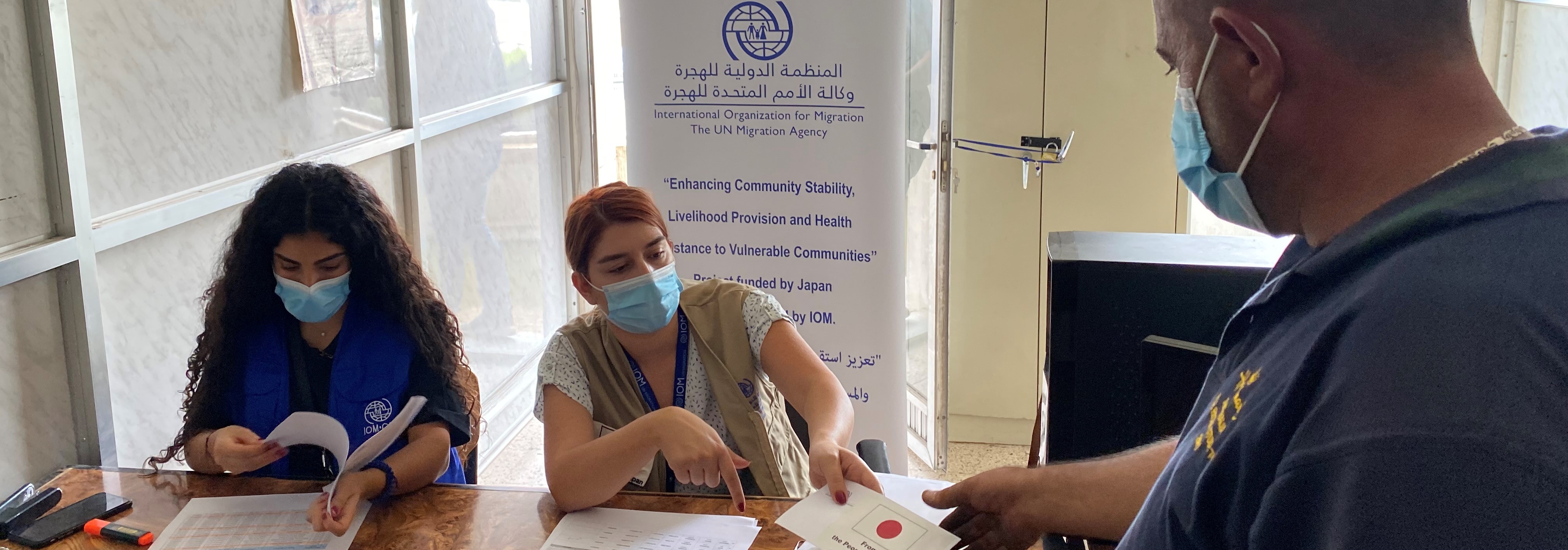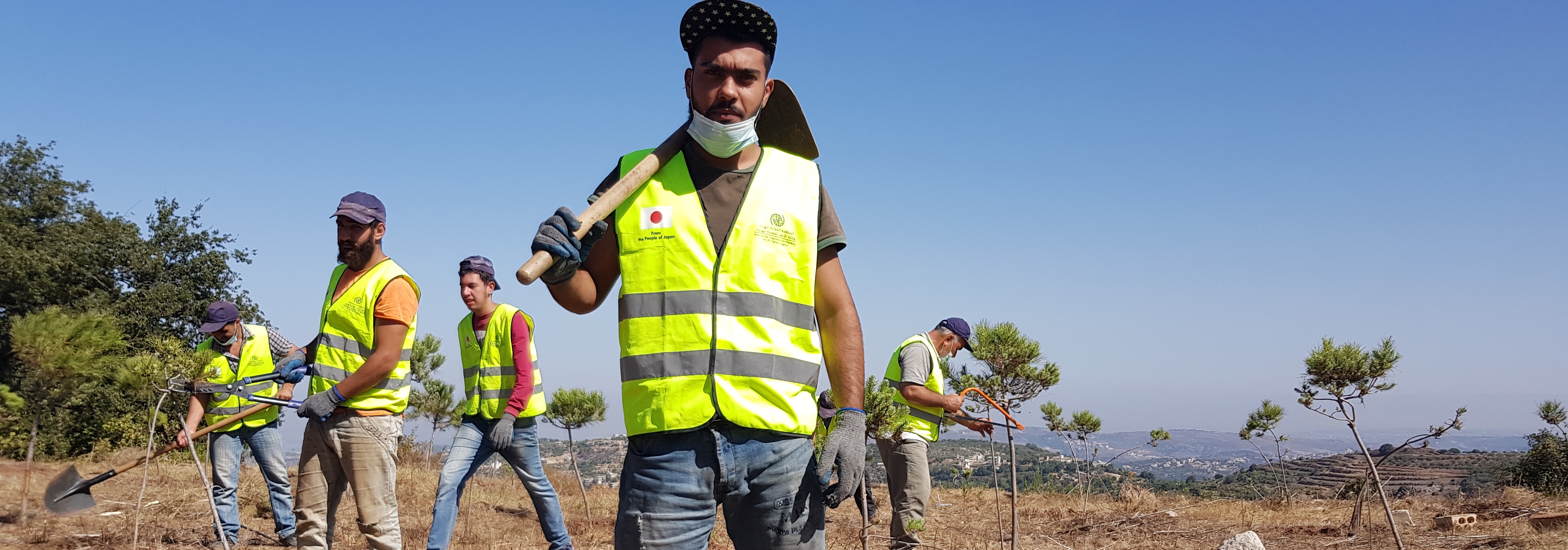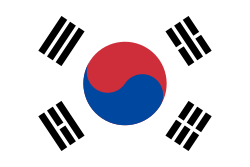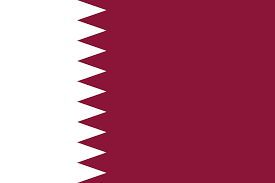IOM Vision
IOM aims to support and protect the most vulnerable individuals across Lebanon, including migrants, refugees, and local community members, against mounting humanitarian needs and socioeconomic hardship caused by a multitude of compounding crises, including but not limited to the impact of COVID-19, Lebanon’s devastating economic collapse and the Beirut Port blast in August 2020. IOM will provide lifesaving support, build economic and community resilience against the loss of job opportunities, growing tensions, and seek to prevent and discourage unsafe and irregular migration all in an effort to address the mobility dynamics of crisis.
Objective
Saving lives and protecting people on the move
|
Under this objective, IOM will target the most vulnerable, including migrants, refugees and Lebanese with life-saving assistance and protection services, with specific attention to those who are exposed to exploitation and abuse, and in need of tailored case management services, while also strengthening protection frameworks and service delivery among local humanitarian actors to better safeguard these individuals. |
|
IOM plans to provide both multi-purpose cash-based assistance, and cash and voucher assistance for specific purposes such as food, and other basic needs, to the most vulnerable including migrants, refugees and Lebanese. Beneficiaries will be identified and referred through IOM outreach workers and IOMs humanitarian partners. Eligibility for assistance will be determined by IOM case managers conducting needs and vulnerability assessments. Eligibility criteria will be clearly communicated to prospective beneficiaries through selection process. Direct assistance will include:
|
|
Either directly or through local NGOs, IOM will provide cash-based and in-kind assistance to cover shelter and non-food items to the most vulnerable, including migrants, refugees, and Lebanese. Beneficiaries will be identified and referred through IOM outreach workers and IOMs humanitarian partners. Eligibility for assistance will be determined by IOM case managers conducting needs and vulnerability assessments. Assistance will include:
|
|
To ensure vulnerable groups can access essential health care, IOM will support primary health care and essential medications for acute and chronic diseases, non-COVID 19 hospitalization by supporting hospital costs, including deliveries, neonatal care, (maternal, neonatal and child health services) diagnostics, specialized psychiatric care for the most vulnerable. Activities will include:
|
|
Based off victim identification and referral through outreach, and/or referrals from partners, IOM will provide protection and assistance to vulnerable migrants, refugees and Lebanese who have been subject to violence, exploitation, and abuse, including Gender Based Violence (GBV), human trafficking, and also irregular migrants rescued at sea or returned. People targeted will receive case management support and services to ensure their needs are considered and properly addressed, either directly by IOM or via onward referral to third party service providers. Protection services will be based on need, and may include:
|
|
With growing numbers of migrants stranded and wishing to leave Lebanon as conditions continue to worsen, IOM will aims to provide voluntary, safe and dignified humanitarian return by air to migrants. This will involve:
|
|
IOM’s rapid response teams will continue responding to humanitarian needs following incidents at the Port of Beirut or other location with disembarking irregular migrants intercepted/rescued at sea. These teams include health staff trained in psychological first aid (PFA). Activities will include:
|

Objective
Driving solutions to displacement
Under this objective, IOM will target neglected and struggling communities, particularly in north Lebanon and hosting substantial refugee populations. Through support to local NGOs, municipalities, primary health-care centres, hospitals and social development centres, as well as IOM direct support, communities’ resilience against negative impacts of economic deterioration and mobility dynamics of crisis will be bolstered through livelihood and community support and strengthening local infrastructure and governance.
|
IOM will provide integrated, area-based interventions designed to support local communities affected by loss of livelihoods, in order to prevent community tensions, and mitigate the drivers of irregular migration. This includes livelihoods and social cohesion activities at the communal and individual level, and through a job creation approach. Activities will include:
|
|
IOM will support and implement activities to help hospitals, primary healthcare, medical supplies, and wider heath system maintain functionality and accessibility for population groups harshly affected by economic deterioration in Lebanon. These will include:
|
|
To strengthen the overall provision of MHPSS in Lebanon, IOM will enable the provision of services by local NGOs. IOM will also work to build the capacity of the Ministry of Social Affairs (MoSA)’s Social Development Centres, through partnership with local NGOs, to provide MHPSS activities and services to local communities, and to foster sustainbale solutions. This will include:
|
Objective
Strengthen preparedness and reduce disaster risk
In this objective, through an all-hazard approach, IOM will primarily target state actors, including the General Security Directorate, Internal Security Forces, Lebanese Armed Forces, municipalities, social development centres, hospitals, local NGOs, and civil society organizations to strengthen their capacity to respond to emerging hazards and prioritizing efforts through thorough risk analyses. The objective will also seek to build IOM’s emergency preparedness in responding to sudden onset disasters and events prompting immediate humanitarian needs. Individuals targeted herein will be survivors of sudden onset disasters, and are not restricted to specific demographic profiles.
|
Activities under disaster prevention aim to strengthen relevant stakeholders’ capacity to reduce the likelihood of possible disasters through a multi-hazard approach. Activities will respond to a mapping of community identified hazards by improving relevant local and national capacities to respond to these dangers. Activities will include:
|
|
IOM will support Lebanese authorities in maintaining effective public health measures and response capacity at points of entry. Activities will include:
|
Objective
Contribute to an evidence-based and efficient crisis response system
Under this objective, IOM intends to contribute to a broader and better understanding the mobility dynamics of crisis, with a specific focus towards migration patterns and processes at community, national and regional levels to inform IOM community-based assistance, planning, informing mission level policy and advocacy and resource mobilization. IOM will target UN bodies, international and local NGOs, government agencies, media platforms, thinktanks and academia.
|
Through the use of field enumerators, data analysts, and technical specialists, IOM Lebanon will conduct a series of research and data activities, to improve knowledge on migration trends in Lebanon, and better monitor population changes over specified periods. This will include:
|
Lebanon
The map used here is for illustration purposes only. Names and boundaries do not imply official endorsement or acceptance by IOM.
Figures are as of 31 December 2023. For more details of IOM's operational capacity in country, please see the IOM Capacity section.

















